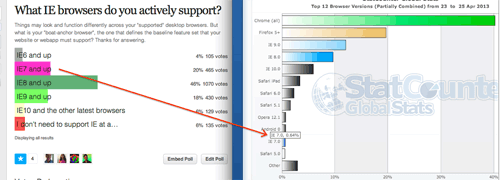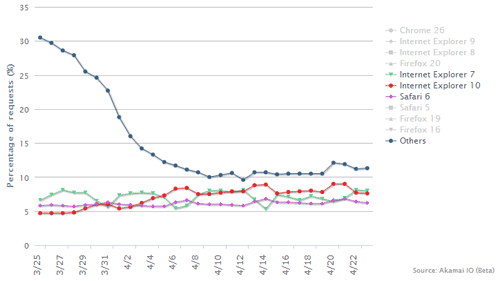Don’t Use Global Browser Stats

When I say “global,” I don’t necessarily mean the whole world, but really any aggregate pile of numbers for browsers that aren’t culled from your own site or project.
With IE6 finally fading (which many developers will claim is a result of their IE6-blocking sites), the ire of developers has turned to Internet Explorer 7. Given that many web developers want to play with the new shiny (and not worry about supporting older browsers) or hate the extra work that sometimes comes with supporting older browsers, it’s no surprise that disdain for IE7 is high.
It is with that experience that I think casually tweeting global stats and calls-to-action can be irresponsible without context, as this one on Friday:
Very surprised how many developers actively support IE7 despite it’s miniscule usage now. Let’s move on! twitter.com/paul_irish/sta…
— Paul Irish (@paul_irish) April 26, 2013
This tweet lead to the usual self-congratulatory responses of how it’s a web developer’s responsibility to force users to upgrade, old browser support is just a false assumption from the client (and maybe that client should be fired [tweet deleted]), money is being thrown at the wrong problem, IT departments are just jerks, and so on. While Paul clarifies in a follow-up tweet that he still thinks the content should be accessible, that point is lost as a tweet response instead of a tweet all his followers will see.
Competing Stats
Some responses were more thoughtful and based on a different source of global stats:
@paul_irish on the other hand, IE7 still has significant marketshare according to Akamai akamai.com/html/io/io_dat…
— David Storey (@dstorey) April 26, 2013

The Akamai chart shows that IE7 is about on par with IE10 and even fares slightly better than Safari 6. The more discerning viewer might notice that Safari use goes up on weekends just a bit while IE7 use drops off for the same period, suggesting IE7 traffic might be coming from office workers.
Ignore Stats That Aren’t Yours
A few people try to make the point that those numbers don’t apply to their sites, some even try to make the point that this isn’t about browser support at all:
@js_dev @paul_irish you’re not supporting browsers, you’re supporting customers. Job #1 is serving your customers.
— Nicholas C. Zakas (@slicknet) April 26, 2013
As an example, I have a site I was working on last night that gets 7.3% of its traffic (over the last month) from IE7. That’s about one in 14 users. I know I have to support users on IE7 because I look at the stats for the site, not because I look to Akamai, StatCounter, or anywhere else.
Here’s the takeaway I want everyone to recognize: The only browser statistics that matter are those for the site you’re supporting.
I feel so strongly about that point that I am going to quote myself just one sentence later:
The only browser statistics that matter are those for the site you’re supporting.
This Applies to Other Stats
I’ve seen plenty of people discuss window sizes over the years and make generalizations about what sizes to support — even more common in the era of responsive web design. But global screen sizes are irrelevant. Instead, look at the numbers for the site you’re supporting. Even better, look at the viewport size:
There has been a resurgence in discussion of late on print styles, but nobody seems to have any stats for how often users print pages. In the absence of raw data, developers talk about how they use sites and how their circle of contacts use sites. Instead, track it for your own sites and know when pages are being printed:
There are many other cases where developers look to global stats in lieu of tracking their own, but I haven’t written tutorials for them. Now might be a great time to consider writing some of your own for the data points you want to capture.
Related
- On Browser Support, by David Bushell, April 26, 2013.
My Previous Rants
- Let’s Treat Old Browser Users Better, July 5, 2012
- Another Anti-IE Gimmick, June 14, 2012
- Exclusion Is a Feature Now, May 10, 2012
- Don’t Blame Opera, Blame Devs, April 27, 2012
- The Return of “Best Viewed in…” March 4, 2012
- Don’t Expect Microsoft’s Auto-Update to Kill IE6, December 23, 2011
- Test in Lynx and Print, It’s Your Job, December 12, 2011
- Everything Will Be the New IE6, December 8, 2011
- Selection Bias When Reviewing Browser Stats, March 13, 2011
- RIP IE6 (Not Really, But Here’s to Hoping), March 4, 2010
Going the Wrong Way
While supporting your users, and by extension their browsers, is the best approach, it is possible to get so focused on browsers themselves that instead of cutting edge you end up doing the opposite (even if it takes time to become apparent). Take this example from the UK Department for Work & Pensions:
The service does not work properly with Macs or other Unix-based systems even though you may be able to input information.
You are likely to have problems if you use Internet Explorer 7, 8, 9 and 10, Windows Vista or a smartphone. […]
There is also a high risk that if you use browsers not listed below, including Chrome, Safari or Firefox, the service will not display all the questions you need to answer.
The supported list of browsers and operating systems are combinations of Microsoft Windows 98, Windows ME, Windows 2000, and Windows XP with the browsers Internet Explorer versions 5.0.1, 5.5 and 6.0, Netscape 7.2, Firefox 1.0.3, and Mozilla 1.7.7.
One Comment
Very interesting your post, although it has been some years ago. I found it looking for statistics from Win 7 + IE 7 users. My website still having a significant number of customers
Leave a Comment or Response